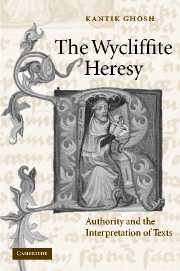Book contents
- Frontmatter
- Contents
- Acknowledgements
- List of abbreviations
- Introduction
- 1 John Wyclif and the truth of sacred scripture
- 2 William Woodford's anti-Wycliffite hermeneutics
- 3 Vernacular translations of the Bible and ‘authority’
- 4 The English Wycliffite sermons: ‘thinking in alternatives’?
- 5 Nicholas Love and the Lollards
- 6 Thomas Netter and John Wyclif: hermeneutic confrères?
- Afterword: Lollardy and late-medieval intellectuality
- Notes
- Bibliography
- Index of names and titles
- General index
- CAMBRIDGE STUDIES IN MEDIEVAL LITERATURE
6 - Thomas Netter and John Wyclif: hermeneutic confrères?
Published online by Cambridge University Press: 22 September 2009
- Frontmatter
- Contents
- Acknowledgements
- List of abbreviations
- Introduction
- 1 John Wyclif and the truth of sacred scripture
- 2 William Woodford's anti-Wycliffite hermeneutics
- 3 Vernacular translations of the Bible and ‘authority’
- 4 The English Wycliffite sermons: ‘thinking in alternatives’?
- 5 Nicholas Love and the Lollards
- 6 Thomas Netter and John Wyclif: hermeneutic confrères?
- Afterword: Lollardy and late-medieval intellectuality
- Notes
- Bibliography
- Index of names and titles
- General index
- CAMBRIDGE STUDIES IN MEDIEVAL LITERATURE
Summary
Thomas Netter of Walden, writing against Wyclif in the 1420s, shares, to one's initial surprise, in the hermeneutic world of his opponent. The peculiar high-medieval synthesis of faith, scepticism and conservative politics which informs William Woodford's theoretical tracts, the Quattuor Determinationes, and which is so alien to the modes of Wyclif's thought, is replaced in Netter's Doctrinale Antiquitatum Fidei Catholicae Ecclesiae by a remarkable (though often, by virtue of their very different politics, tenuously sustained) agreement with the heresiarch on certain fundamental assumptions about the nature of Christianity. And this is perhaps not so remarkable after all: for Woodford's work assumes a secure political and academic environment which had been severely threatened by the time Netter was writing. Though Netter does not, as a rule, address directly the problems raised by the conversion of Wycliffism into an extra-mural movement of popular radicalism, his work is informed by an urgent consciousness of the necessity of endowing the ecclesiastical status quo with a firm theoretical anchorage. His is a full-scale attempt at justification, but like Wyclif's work and unlike that of Woodford, it betrays no pragmatic awareness of itself as one kind of rhetorical gesture among several. The academic, sceptical-rhetorical consciousness of the contingency of authorities and interpretations and their implicatedness in the uncertainties and mutabilities of various kinds of politics is rigorously – often uneasily – shunned by Netter: he is very much, like his opponent, arguing for determinate religious truth.
- Type
- Chapter
- Information
- The Wycliffite HeresyAuthority and the Interpretation of Texts, pp. 174 - 208Publisher: Cambridge University PressPrint publication year: 2001



